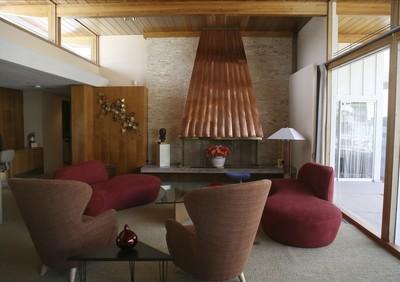MIRACLE FOR MORELLI

How does a group of volunteers get the “grandfather of modern furniture design” to sign on as interior decorator of a 48-year-old home they are rehabilitating? And get his noted furniture designs donated to the project? Members of the Junior League of Las Vegas describe it as nothing short of a miracle.
Sherry Colquitt said her meeting with Vladimir Kagan was just one in a series of miraculous coincidences that have happened as she has worked to rehabilitate the Morelli House and transform it into a prime example of midcentury modern architecture.
The house, now at 861 Bridger Ave. in downtown Las Vegas, was built in 1959 by Antonio Morelli and his wife, Helen, overlooking the Desert Inn Country Club and Golf Course. It was extremely modern for its time and has remained virtually unchanged.
The Junior League has spent the better part of the past decade acquiring the house, moving it to its present location and rehabilitating it. One of the final steps before opening it to the public as a historical cultural center was to get it furnished.
In June of last year, Colquitt, who serves as director of the Morelli House project as well as chairman of the Junior League’s endowment fund that owns the home, went to the World Market Center in downtown Las Vegas to inquire about finding some midcentury furniture for the house. It just happened to be the day before Kagan and his wife, Erica Wilson, were scheduled to speak at the monthly First Fridays seminar at the Las Vegas Design Center.
Colquitt was invited to attend the seminar, with the promise of a meeting with Kagan to seek his advice, said Dedee Nave, project director for the Morelli House interpretive program and vice chairman of the endowment fund.
Colquitt admits that before she met Kagan, she didn’t know him by name or how famous he was, but was familiar with his furniture designs.
“That’s probably a good thing. Otherwise we would have been so intimidated,” added Nave.
Not only did they meet Kagan, the ladies’ enthusiasm for the project convinced the designer to learn more about it.
“One of the visitors to my lecture was one of the ladies from the Junior League. She asked if I would come over to see their house and I was delighted. There was this wonderful house with dreadful furniture on the inside,” Kagan said from his home in New York.
He said the bones of the house and its “great ’50s architecture” inspired him to volunteer and help the Junior League furnish the house appropriately.
“My history has a lot to do with midcentury architecture. It is the period in which I had my beginnings, so I have a nice empathy for that architecture,” he said.
Prior to becoming an internationally renowned furniture designer, Kagan studied architecture at Columbia University.
Colquitt said she was surprised and ecstatic that “a man of his talent and his reputation would take an interest in our little project in Las Vegas.”
Since 1997, the Junior League has been working on the historical preservation project that encompassed rehabilitating an old home and turning it into both an educational center for the community and a headquarters for the service organization for women. During that period, they faced numerous obstacles, some of which seemed insurmountable, including having the house members originally targeted for rehabilitation burn to the ground two days before it was to be moved to a permanent location and encountering expansive soil problems on the site that had to be remedied.
Now nearly completely rehabilitated, the Morelli House debuted to the public earlier this week during a celebration co-hosted by the Las Vegas Chapter of the Architects Institute of America that included a lecture on midcentury architecture by Alan Hess, a noted architectural historian; presentation of the Livable Community Award to the Junior League by the architects organization; and premier of the 2007 edition of Architecture Las Vegas, the architectural organization’s official publication that features an article on the project.
The lecture was funded in part by a grant from Nevada Humanities and underwritten by SH Architecture.
Colquitt and Nave said the Junior League would never have completed the house to its current level without the help and advice of Kagan.
“It was a love affair,” Kagan said of his work on the house. It is a wonderful workspace for my early furniture.”
Several of Kagan’s designs from the 1950s and ’60s are showcased in the living and dining rooms. He said the pieces keep the spirit of the house alive.
In addition to donating pieces from his own collection — a tri-symmetric stool, a limbus table and six cubist dining chairs — Kagan contacted several of the manufacturers that reproduce his designs.
Within a week, he had secured donations from American Leather, which provided two Serpentine sofas, and Weiman/Preview Furniture, which provided two barrel chairs, a sculptured coffee table and some matching fabric so the nonprofit organization could reupholster several chairs in the kitchen dining nook.
Additionally, Kagan selected carpeting for the house and specified how the furniture was to be arranged. All of this was done through e-mails and regular telephone calls since he was unable to leave his home because his wife was recuperating after breaking a hip.
Kagan said working on the Morelli House was his first pro bono job for a charitable organization. He hopes that his contribution brings greater recognition to practicality of midcentury architecture as well as introduces his designs to a new audience.